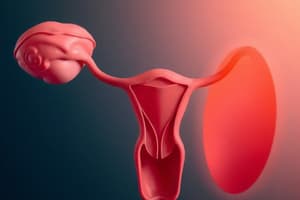Podcast
Questions and Answers
What is a primary focus of population control strategies?
What is a primary focus of population control strategies?
- Increasing the birth rate to boost economic growth
- Managing population growth to enhance resource sustainability (correct)
- Encouraging migration to alleviate local resource shortages
- Decreasing population density in urban areas
Which of the following is NOT considered a benefit of reproductive technologies like IVF?
Which of the following is NOT considered a benefit of reproductive technologies like IVF?
- Increased chances of multiple births
- Assistance for couples facing infertility
- Reduction in the incidence of genetic disorders
- Improvement in overall reproductive health for all women (correct)
Why is adolescent reproductive health education crucial?
Why is adolescent reproductive health education crucial?
- To emphasize the importance of hormonal contraceptives only
- To discourage any sexual activity among teenagers
- To equip adolescents with knowledge for responsible reproductive choices (correct)
- To promote early childbearing and establish families
Which preventive measure is NOT recommended for avoiding sexually transmitted infections (STIs)?
Which preventive measure is NOT recommended for avoiding sexually transmitted infections (STIs)?
What factor does NOT impact reproductive health decisions according to societal influences?
What factor does NOT impact reproductive health decisions according to societal influences?
What is one common cause of infertility in males?
What is one common cause of infertility in males?
Which of the following best describes hormonal methods of contraception?
Which of the following best describes hormonal methods of contraception?
What is a primary focus of reproductive health?
What is a primary focus of reproductive health?
Which method of contraception is considered a barrier method?
Which method of contraception is considered a barrier method?
How do sexually transmitted infections (STIs) primarily spread?
How do sexually transmitted infections (STIs) primarily spread?
Which of the following is NOT a common symptom of sexually transmitted infections?
Which of the following is NOT a common symptom of sexually transmitted infections?
What is a key consideration when discussing medical termination of pregnancy (MTP)?
What is a key consideration when discussing medical termination of pregnancy (MTP)?
Which of the following statements about contraceptive methods is accurate?
Which of the following statements about contraceptive methods is accurate?
Flashcards
Population Control
Population Control
Managing population growth and its effects on resources, environment, and human well-being.
Reproductive Technologies
Reproductive Technologies
Techniques like IVF (in-vitro fertilization) that help couples overcome infertility.
Adolescent Reproductive Health
Adolescent Reproductive Health
Educating adolescents about reproductive health to make informed choices about their sexual and reproductive lives.
Preventing STIs
Preventing STIs
Signup and view all the flashcards
Hormonal Contraceptives
Hormonal Contraceptives
Signup and view all the flashcards
Fertilization
Fertilization
Signup and view all the flashcards
Menstrual Cycle
Menstrual Cycle
Signup and view all the flashcards
Implantation
Implantation
Signup and view all the flashcards
Spermatogenesis
Spermatogenesis
Signup and view all the flashcards
Oogenesis
Oogenesis
Signup and view all the flashcards
Male Reproductive System
Male Reproductive System
Signup and view all the flashcards
Female Reproductive System
Female Reproductive System
Signup and view all the flashcards
Sexually Transmitted Infections (STIs)
Sexually Transmitted Infections (STIs)
Signup and view all the flashcards
Study Notes
Class 12th Chapter 6 Biology: Notes
- Introduction to Human Reproduction: This chapter focuses on the processes involved in human reproduction, from the development of gametes to the birth of a child. It examines the various stages and systems involved.
- Male Reproductive System: Comprises organs like the testes, epididymis, vas deferens, seminal vesicles, prostate gland, and urethra. These organs produce and transport sperm, along with the secretions crucial for fertilization.
- Female Reproductive System: Includes the ovaries, fallopian tubes, uterus, cervix, and vagina. The ovaries produce ova and the fallopian tubes facilitate fertilization. The uterus provides the environment for the developing embryo during pregnancy.
- Gametogenesis: Spermatogenesis in males produces spermatozoa (sperm) in the testes through a specialized process. Oogenesis in females results in the formation of ova (eggs) within the ovaries, involving meiosis.
- Menstrual Cycle: A cyclic series of changes that occur in the female reproductive system to prepare for possible pregnancy each month. Hormonal regulation plays a vital role.
- Fertilization: A complex process where the sperm and egg fuse to form a zygote, typically occurring in the fallopian tube.
- Implantation: The process by which the implanted zygote attaches to the uterine wall, marking the beginning of pregnancy.
- Embryonic Development: The formation and development of the embryo from the zygote, involving cell division and differentiation. Key stages are outlined in the chapter.
Class 12th Chapter 7 Biology: Notes
- Reproductive Health: Explores the various aspects of human reproductive health, encompassing issues like sexually transmitted infections (STIs), contraception, infertility, and population control.
- Sexually Transmitted Infections (STIs): Focuses on different types of STIs, their causes, symptoms, prevention, and treatment.
- Contraception: Discusses various methods of birth control, including barrier methods, hormonal methods, intrauterine devices (IUDs), and surgical methods. The effectiveness and side effects of each method are examined.
- Infertility: Covers causes and treatment options for infertility in both males and females.
- Medical Termination of Pregnancy (MTP): Explores the legal and ethical aspects of safe abortion. Current laws and the importance of safe procedures are mentioned.
- Population Control: Deals with issues of population growth and its impact on resources, environment, and human well-being. Strategies for managing population growth are highlighted.
- Reproductive Technologies: Discusses assisted reproductive technologies like IVF (in-vitro fertilization) and other techniques that help couples overcome infertility.
- Importance of Adolescent Reproductive Health: Emphasizes the importance of education and awareness regarding reproductive health among adolescents to make informed choices about their reproductive lives.
- Prevention of Sexually Transmitted Infections: Provides details about preventive measures to avoid STIs, including safe sex practices, vaccination, and early detection.
- Hormonal Contraceptives: Discusses birth control options that work through hormonal manipulation impacting the reproductive cycle.
- Societal Impact on Reproductive health Issues: Highlights cultural, economic, and social factors influencing reproductive health decisions and access to care.
Studying That Suits You
Use AI to generate personalized quizzes and flashcards to suit your learning preferences.




